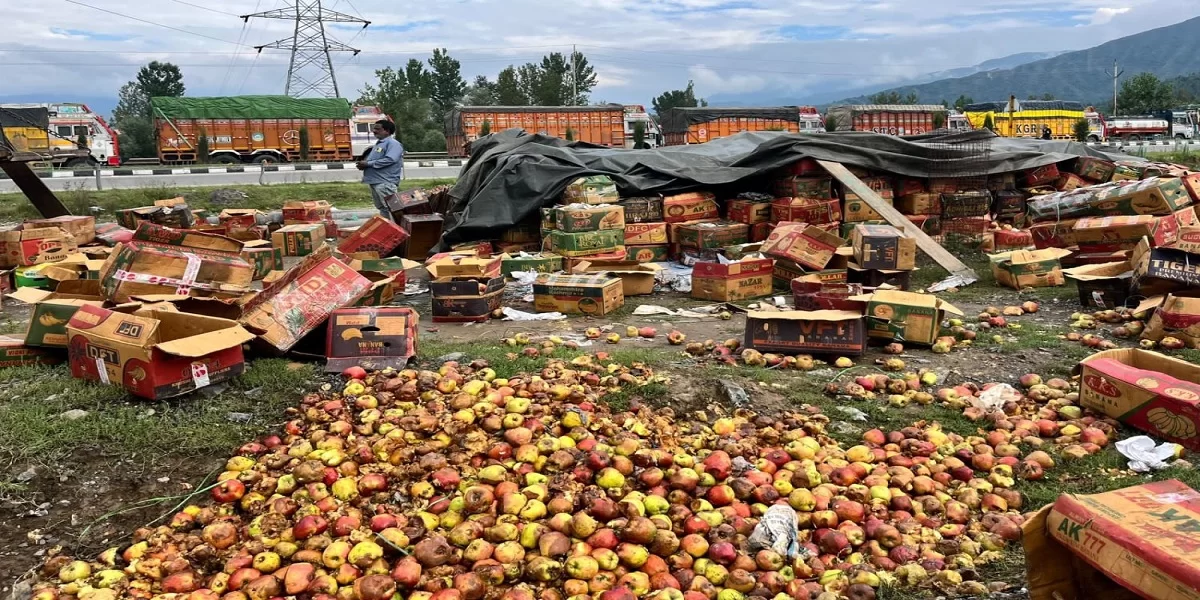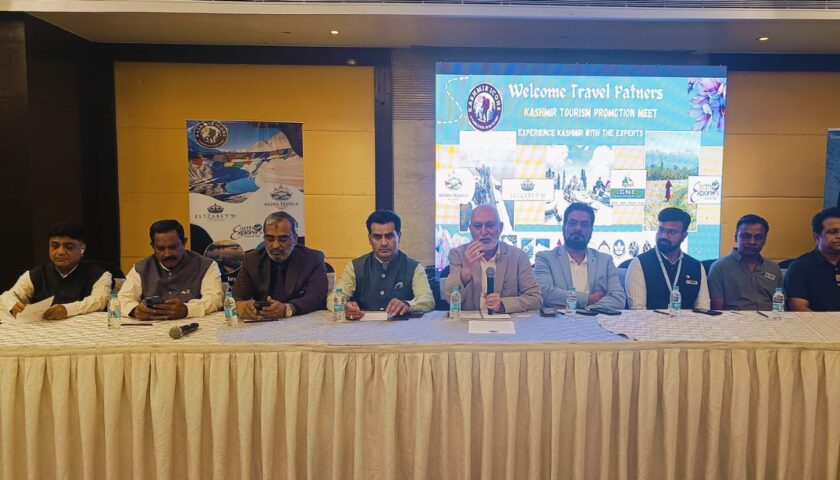NH-44 Blockade Turns Harvest into Havoc: 5,000 Trucks Stranded Across the Valley
By: Javid Amin | 16 September 2025
When Apples Turn Bitter
Every autumn, Kashmir’s landscape transforms into a breathtaking canvas. Rolling orchards in Shopian, Kulgam, Baramulla, and Pulwama burst with red and golden apples. For centuries, this harvest has symbolized not just prosperity but also identity—the Valley’s proud offering to India and the world. Apples from Kashmir are not just fruit; they are heritage, livelihood, and a lifeline for over 3 lakh families.
But in 2025, the Valley’s orchards tell a different story. Over 5,000 trucks stand stranded along the battered stretches of the Jammu–Srinagar National Highway (NH-44). Crates once meant for bustling mandis in Delhi and Punjab now ooze with rot. Farmers who worked year-round watch helplessly as their produce—worth over ₹1,200 crore—decays before their eyes.
“This isn’t just a traffic jam,” says Bashir Ahmad, an orchardist from Shopian. “It’s a chokehold on our lives.”
Kashmir’s Apple Economy: A Red Goldmine in Peril
Before diving into the crisis, it is important to understand what apples mean to Kashmir’s economy:
-
20 lakh metric tonnes of apples are produced annually in J&K.
-
The sector contributes 8% to J&K’s Gross State Domestic Product (GSDP).
-
Over 3 lakh families are directly dependent on orchards for income.
-
The industry supports thousands of jobs in transport, packaging, cold storage, and export logistics.
-
Kashmiri apples dominate markets in Delhi, Mumbai, Punjab, and even Gulf countries.
Yet this economic powerhouse is uniquely vulnerable. With no all-weather connectivity, limited storage infrastructure, and overreliance on NH-44, even a few days of disruption can turn abundance into bankruptcy.
NH-44 Blockade: A Lifeline Turned Chokepoint
The Jammu–Srinagar National Highway, also known as NH-44, is Kashmir’s umbilical cord. Every litre of petrol, every cylinder of LPG, every kilo of mutton, and every crate of apples must pass through this 270 km stretch.
But the highway has become notorious for its fragility:
-
Frequent landslides near Ramban and Banihal cut off traffic for days.
-
Poor planning leaves diversions muddy and unsafe.
-
Administrative apathy delays clearance of stranded vehicles.
For farmers, this fragility is devastating. Apples are perishable. A delay of even 48 hours can reduce their market value by 40–50%. Now, with weeks-long blockades, entire consignments are rotting.
Truck drivers, parked bumper-to-bumper in suffocating queues, recount sleepless nights without food or toilets.
“By the time we reach Delhi, half the fruit will be pulp,” says Nazir Ahmad, a truck driver from Pulwama.
The blockade has also sparked allegations of discrimination. Orchardists allege that while iron and cement trucks are cleared, fruit-laden trucks remain stuck.
“Why is construction material more urgent than food?” asks Mohammad Yousuf, another orchardist.
Railways: Symbolic Gesture or Real Solution?
Under mounting pressure, the government launched a special apple parcel train from Anantnag. Initially hailed as a lifeline, the reality soon became clear.
-
Kashmir’s annual apple production: 20 lakh metric tonnes
-
Capacity of each train: a few hundred tonnes
-
Effective output: negligible compared to road transport
At the current pace, it would take 190 years to ship one season’s harvest.
“We need roads, not ribbon-cutting ceremonies,” says Altaf Lone, a fruit trader in Sopore.
While the railway option offers symbolic hope, in practice it is logistically irrelevant. Farmers view it as propaganda, not policy.
Sopore Mandi Shutdown: Rage in the Fruit Bowl of Asia
Sopore’s fruit mandi is Asia’s second largest. Normally buzzing with auctioneers and buyers, it now echoes with silence. Growers and traders have shut down operations in protest, staging sit-ins and rallies.
“Our year’s toil is rotting in trucks. We won’t stay silent,” declares Irfan Mir, a mandi coordinator.
The shutdown has created a ripple effect across the Valley:
-
Transport disruptions: School vans and public carriers stuck in jams.
-
Price spikes: Vegetables and essentials cost more in Srinagar.
-
Labor losses: Daily wage workers left unemployed.
Sopore’s silence is more than protest—it’s a collective cry of despair.
Political Fallout: Blame Game in the Valley
The crisis has reignited political tensions. Former Chief Minister Omar Abdullah has demanded that NH-44’s management be transferred to the J&K government.
“If iron shipments can pass, why are apples held back?” he asked during a press conference.
On the other hand, the LG administration insists the blockade is caused by natural conditions, not mismanagement. Officials argue that weather and topography are beyond control.
But farmers remain unconvinced. For them, the crisis is not just about landslides—it is about systemic neglect.
Cultural Impact: Apples Beyond Economy
Apples in Kashmir are not just commodities; they are cultural markers.
-
During weddings, families gift crates of apples as wartav (symbolic prosperity).
-
Apples are offered as gulmuteeh—sweet gestures of love.
-
Festivals and rituals often feature the fruit as a centerpiece.
Now, those traditions are disrupted.
“We used to gift apples during weddings. Now we gift apologies,” says Javid Amin, publisher of KashmirPost.
The rot is not just economic—it is emotional and cultural. Apples that once symbolized honor now symbolize helplessness.
Ripple Effects: A Valley-Wide Economic Shock
The apple crisis does not stop at orchards. It has triggered sector-wide breakdowns:
-
Transporters: Trucks idle for weeks, consuming fuel without earning revenue.
-
Laborers: Loading/unloading work has collapsed.
-
Cold Storage: Overcapacity has led to spoilage.
-
Exporters: Global buyers lose confidence in Kashmiri suppliers.
-
Local Retailers: Prices swing wildly—crashing in some markets, spiking in others.
Every link in the chain suffers. And with 3 lakh families directly dependent on horticulture, the stakes are monumental.
Case Studies: Stories from the Ground
Case 1: Bashir Ahmad, Orchardist (Shopian)
Bashir invested ₹7 lakh this year in fertilizers, pesticides, and labor. His entire harvest now lies stranded. “I took a loan to manage costs. Now, I have nothing to pay back with.”
Case 2: Nazir Ahmad, Driver (Pulwama)
Nazir left with his truckload of apples on September 1. By September 15, he was still stuck near Ramban. His fruit had already started to rot. “Even if I reach Delhi now, who will buy this?”
Case 3: Shazia Bano, Laborer (Sopore)
Shazia, who loads crates at Sopore mandi, has been without work for three weeks. “We survive on daily wages. With no mandi work, we borrow just to eat.”
These stories illustrate that the crisis is not abstract—it is deeply personal.
Comparing Past Crises: A Familiar Pattern
The apple crisis fits into a larger timeline of Kashmir’s recurring economic suffocation:
-
2014 floods: Washed away orchards and disrupted trade.
-
2016 unrest: Curfews halted transport.
-
2019 lockdown: Communications blackout paralyzed logistics.
-
2020 pandemic: Tourism collapsed, affecting related markets.
-
2025 blockade: Apples rot while policy stagnates.
Each time, Kashmir’s economy is left to rebuild from rubble—with little structural reform.
Policy Failures and Governance Gaps
Why does this crisis keep repeating? Experts point to systemic failures:
-
Overdependence on NH-44: No alternate all-weather corridors.
-
Lack of cold chain infrastructure: Limited ability to preserve apples during delays.
-
Market centralization: Overreliance on Delhi mandis, with little diversification.
-
Political neglect: Decision-making controlled from Delhi, with little regional autonomy.
The absence of a region-specific economic strategy leaves Kashmir vulnerable to every disruption.
Long-Term Risks: Will Farmers Abandon Orchards?
If these crises continue, farmers may lose faith in horticulture altogether. Already, younger generations are turning away from orchards. Many migrate to cities for jobs, abandoning family land.
“If my father’s apples rot every year, why should I continue?” asks 24-year-old Imran, a student in Anantnag.
This could lead to:
-
Decline in horticultural output
-
Loss of traditional knowledge
-
Cultural disconnect from land
The risks are not just economic but existential.
Solutions: From Band-Aids to Blueprints
Experts propose several long-term measures:
-
All-Weather Tunnels: Expand Zojila and Chenani-Nashri models to NH-44.
-
Cold Chain Infrastructure: Build modern storage units in every fruit belt.
-
Market Diversification: Create alternate hubs in Bangalore, Kolkata, and Gulf markets.
-
Digital Platforms: Direct-to-customer sales via apps and e-commerce.
-
Policy Autonomy: Restore statehood to allow region-specific interventions.
-
Apple Corridors: Dedicated lanes for perishable goods during crises.
Without such measures, Kashmir will remain trapped in an endless cycle of boom and bust.
Editorial Reflection: Deliberate Strangulation or Neglect?
The crisis cannot be brushed aside as “bad weather.” It reveals a deeper pattern:
-
Political power — erased.
-
Handicrafts — fading.
-
Tourism — crippled.
-
Fruit industry — rotting.
-
Language — erased.
-
Dignity — diminished.
Each sector tells the same story: Kashmir’s lifelines are being unplugged, one by one. Whether by design or neglect, the outcome is the same—a Valley gasping for survival.
Bottom-Line: From Rot to Resilience
Kashmiris have always been resilient. From floods to curfews to pandemics, the Valley has rebuilt each time. But resilience cannot forever substitute for justice.
The apple crisis of 2025 must be a turning point. Not just for farmers, but for policymakers, civil society, and the nation.
Because apples in Kashmir are not just fruit. They are identity, pride, and survival. When apples rot, an entire civilization suffers.




